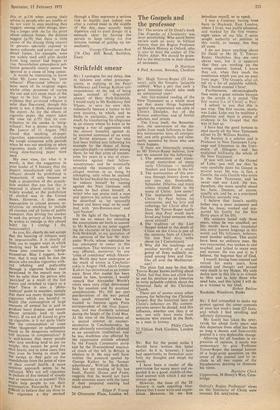Strikfeldt smear
Sir: I apologise for my delay, due to sickness and other preoccup- ations, in replying to the Peter Reddaway and George Katkov cor- respondence. At the risk of being again accused of 'disgraceful smears' of Herr Strik-Strikfeldt, I would reply to Mr Reddaway that Vlasov, to save his own skin, voluntarily became a traitor to his own country, to which, and to Stalin in particular, he owed so much, by transferring his allegiance to an enemy whom he knew to be waging a war of aggression with the utmost brutality against it; he assumed command of an army of Soviet prisoners of war who had been bullied into following his example by the threat of being starved todeath—a minority among them; he led that army of mercen- aries for years in a war of exter- mination against their fellow- countrymen; and he eventually revealed the insincerity of his alleged motives in so doing by attempting, only when he realised that he had backed the wrong horse, to redeem himself by turning against the Nazi Germans with whom he had allied himself. A writer who can praise such a man and approve his action can hardly be described as 'an unusually honest and brave man' or be ere& ited with 'pro-Russian-ness' and 'anti-Nazism'.
In the light of the foregoing, I can see no reason for retracting the assumptions set forth in answer to Mr Katkov in my letter regard- ing the character of his friend Herr Strik-Strikfeldt, or my quotation of the opinions of the late Mr Alex- ander Werth, whose reputation he has attempted to smear in this connection. That testimony is in no way affected, moreover, by any 'crisis of conscience' which Alexan- der Werth may have undergone as the result of events in Czechoslo- vakia in August 1968, which George Katkov has introduced as an irrelev- ancy. Since that matter has been raised by him, however, I would remark that Alexander Werth's views were very often determined by his emotion and by practical considerations. His 100 per cent pro-Sovietism of the war period was much tempered when he wanted to become again Paris correspondent of the New States- man, and was discreetly subdued during the height of the Cold War. At the time of the frustration of a second attempt at counter- revolution in Czechoslovakia, he was obviously emotionally affected as an unrealistic intellectual, and he was doubtless also affected by the opportunist attitude adopted by the French Communist party and by the ill-considered reaction of much of the left in Britain in relation to it. He may well have written the postcard quoted by George Katkov to his 'former schoolmate', Wilfried Strik-Strik- feldt, but my reading of his last book, Russia: Hopes and Fears, suggests that he would not have made common cause with the latter if their projected meeting had taken place.
Edgar P. Young 24 Gloucester Place, London wl


































 Previous page
Previous page